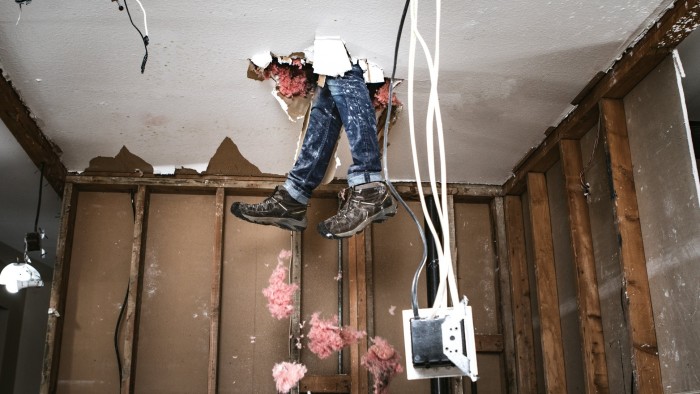Unlock the Editor’s Digest for free
Roula Khalaf, Editor of the FT, selects her favourite stories in this weekly newsletter.
Illegal trading practices have become “decriminalised” in large parts of Britain thanks to under-resourced local councils, the head of a trading standards body has warned.
John Herriman, chief executive of the Chartered Trading Standards Institute (CTSI), told the FT that underfunded and depleted council departments had exposed consumers to rogue traders and unsafe goods.
The warning comes after official estimates, in data released last month, found defective products and substandard services cost UK consumers £71.2bn last year, up from £22.9bn in 2015.
The biggest losses came from home and garden maintenance services, costing the UK consumers £10.3bn — though this is probably an underestimate, according to the Federation of Master Builders (FMB).
Budget cuts underpin much of the increased losses, according to the CTSI. Since 2011, spending on regulatory services overall has fallen by 25 per cent, National Audit Office data shows, with trading standards — a statutory service — suffering a 50 per cent budget cut in the past decade.
The CTSI said staffing levels within trading standards have fallen by 40 per cent since 2015 to critically low levels, resulting in low morale and dwindling capacity to enforce 300 consumer protection laws which have grown from 250 in the past few years.
“Legislation is only as good as the enforcement that goes with it . . . that needs people to go out on the ground and work with local businesses and make sure illegal traders know they’re likely to get caught out and stuff will be confiscated,” Herriman said. “You cannot do this remotely.”
In the UK, local trading standards teams carry out market surveillance and prosecutions of breaches from food labelling to petrol pump price accuracy. National regulators such as the Financial Conduct Authority, meanwhile, handle cross-regional or broader market issues.
Rocio Concha, director of policy and advocacy at Which?, the consumer group, said “inadequate” trading standards services had created a “postcode lottery” for consumer protection.
“From cowboy builders turning up to people’s houses and leaving work unfinished, to small businesses having their products counterfeited and being undercut by overseas manufacturers, gaps in the consumer enforcement system have made it impossible for many teams to carry out essential work,” said Concha.
Kate Pike, regional co-ordinator for trading standards for north-west England, blamed chronic underfunding for the drop in standards. “We didn’t invest in this service for such a long time during austerity and the chickens are coming home to roost now,” she said. “That’s a shame.”
Three London boroughs have only one or two members of staff in their trading standards team, amounting to less than one per 100,000 residents, according to data released under Freedom of Information requests by Which? By comparison, trading standards for Devon, Somerset, Plymouth and Torbay have 67 total staff, or 3.7 staff per 100,000 people.
Both the FMB and CTSI raised concerns that this is permitting the rise of rogue traders installing insulation — particularly spray foam — without proper surveys or expertise, leading to damage such as timber decay or moisture build-up. But because surveyors are unable to inspect roof timbers once spray foam is installed, lenders often refuse mortgages or equity release applications for any affected properties.
Herriman said he has seen cowboy traders then profiting again through foam removal services, creating a “pernicious cycle that can only be broken by having the right level of market surveillance”.
Jeremy Gray of the FMB said that because there are no minimum competence levels for builders “you’ve just got to hope you are getting the right person in. We suggest getting three quotes first. You cannot always trust online reviews.”
Beefing up trading standards is “a good move to protect consumers, but there’s plenty more to do”, Gray said, urging the introduction of a licensing system for builders — with the power to revoke licences when necessary.
Herriman said the trading standards service — 2,280 officials across England, Scotland and Wales — “doesn’t get the recognition that it deserves at the moment”, urging the government to allocate an extra £100mn to rebuild capacity.
He said the government was driving a dual narrative, where “we are seeing more burdens being imposed on trading standards by the government”, such as the new Digital Markets, Competition and Consumers Act, even as ministers seek to slash bureaucracy and deregulate.
The department of business and trade told the FT that councils decide on spending allocation for trading standards, but that “we recognise the challenges from increased demand on critical services”.
It added: “At a national level we support local trading standards with intelligence and testing.”
Your rights if building work goes wrong
If there is a problem with any building work you have had carried out, you should be able to get it fixed, or at least receive a partial refund. You can also ask for money off for the inconvenience. If a refund is agreed, it must be paid within 14 days.
First, take up the problem with the trader who arranged the work, even if they subcontracted all or some of it to another business.
Before making a complaint, ensure you have gathered any paperwork and receipts; taken photos to use as evidence; and made notes about what happened, including the dates and times.
If you cannot come to an agreement, you could consider making a claim online via HM Courts & Tribunals Service for small claims, or contact your bank or insurance provider to see if they can support you with recovering costs in the event of fraud or faulty work.
Or you could use an alternative dispute resolution scheme; the Federation of Master Builders has its own service for members and their clients, for example.
Report any traders you believe have acted dangerously immediately to your council and to the local trading standards authority.




